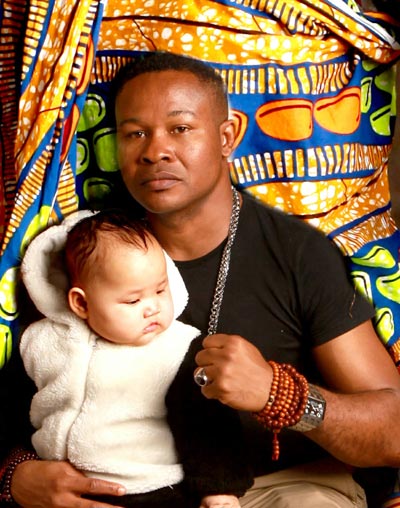 |
|
One of Ajike Njoku's favorite images is this self-portrait, in which he sees a Chinese child examining "the potential of Africa" in his big hand. [Photo provided to China Daily] |
Multimedia artist Ajike Njoku uses art to preach peace and tolerance and to promote social harmony, Mike Peters reports.
Ajike Njoku is never shy and always direct, whether communicating with his rich, merry voice or his camera or even his drums. "A world gone crazy gave its gun to a 12-year-old," writes the Beijing-based multimedia artist in the introduction of his book, AK-47 in a Wild Why World. Despite a litany of frustration with the culture of victimhood on his home continent, the 37-year-old Nigerian's book is not a long whine but a rallying cry.
Though modern African society faces "myriads of problems", he says, it doesn't need to depend on external forces to solve them. His biting commentary in the book is laced with irony and other humor, including cartoons that are sometimes as edgy as Aaron McGruder's The Boondocks in the US.
Njoku's fine-art ink-wash drawings, meanwhile, have almost unnecessary titles with messages: In Abandoned Responsibility, for instance, a swarm of toddlers climb on their African mom as one of the youngsters stares down his unkempt father in the foreground.
In the past six years, Njoku has shifted his focus from the way Africans see themselves to the way Chinese and Africans see each other. As he continues to write narratives, humor and poetry, he and his camera are all over China, capturing images of Africans who have built new lives here.
While too many Africans see themselves as victims, he says, many Chinese have seen Africans as "people just out to make a buck any which way they could".
Few people, he says, realized what the African community was giving back to Beijing and the other Chinese cities where they have studied and made their lives and homes.
To change perceptions, says the man who goes by the moniker "Saint Jerry", he began publishing LensAfrika, a magazine focused on telling the African story in the world's second-largest economy, in 2009.
|
|
|
|
|
|
|
|
